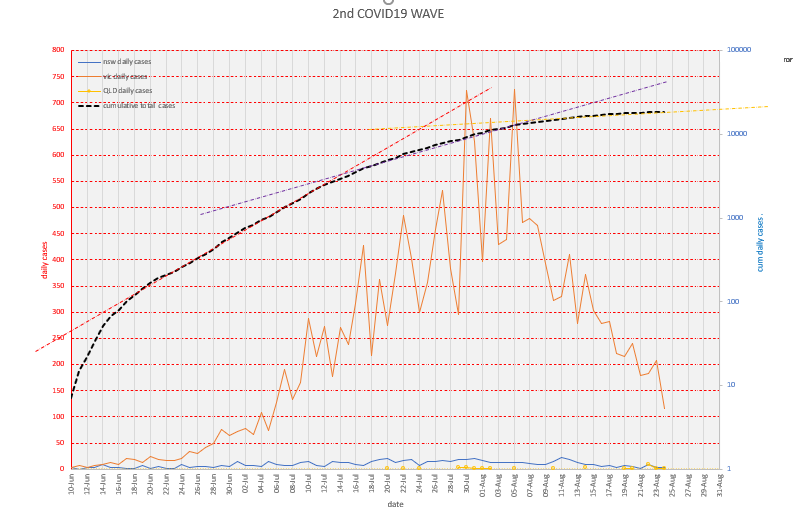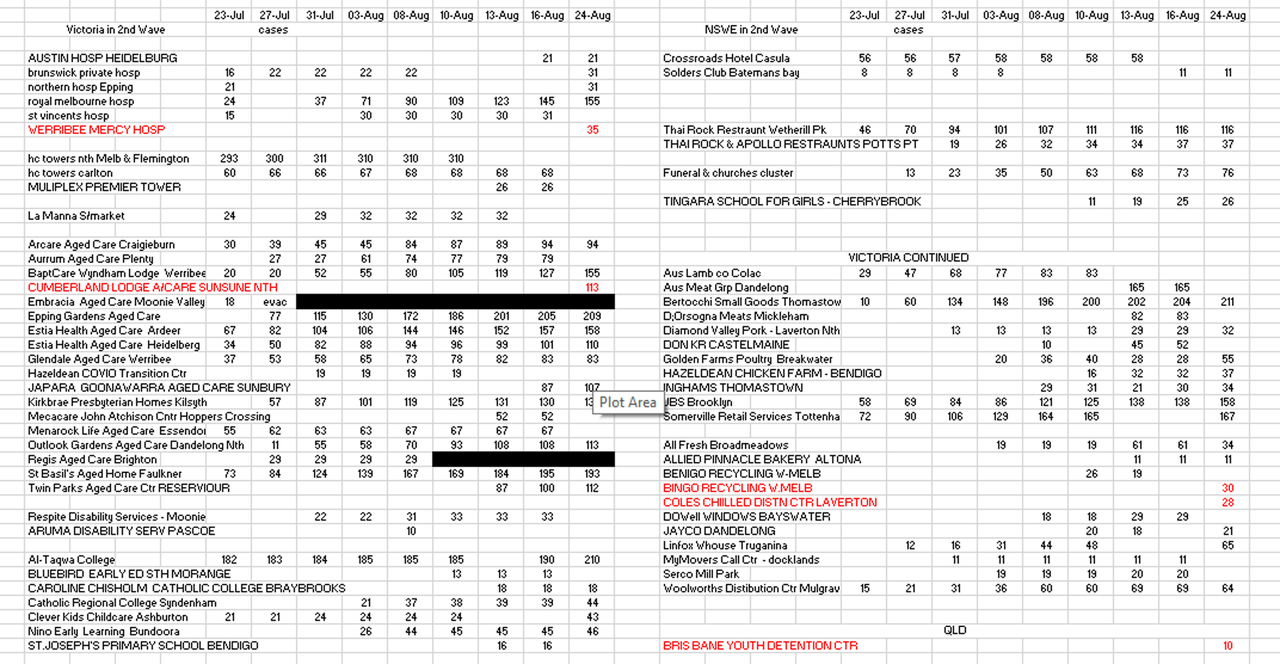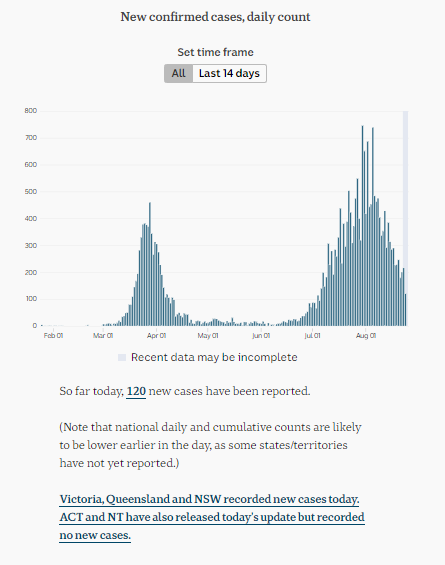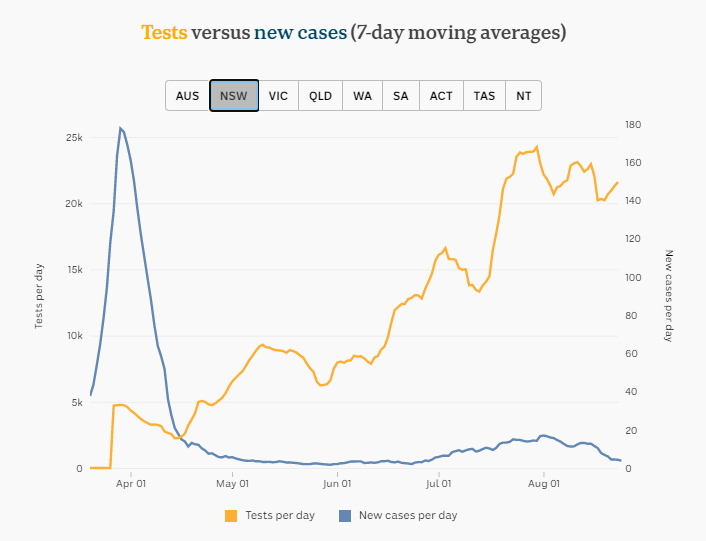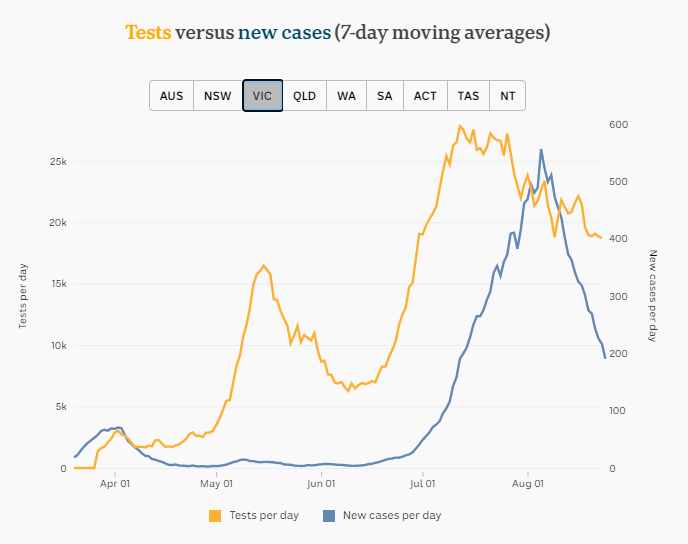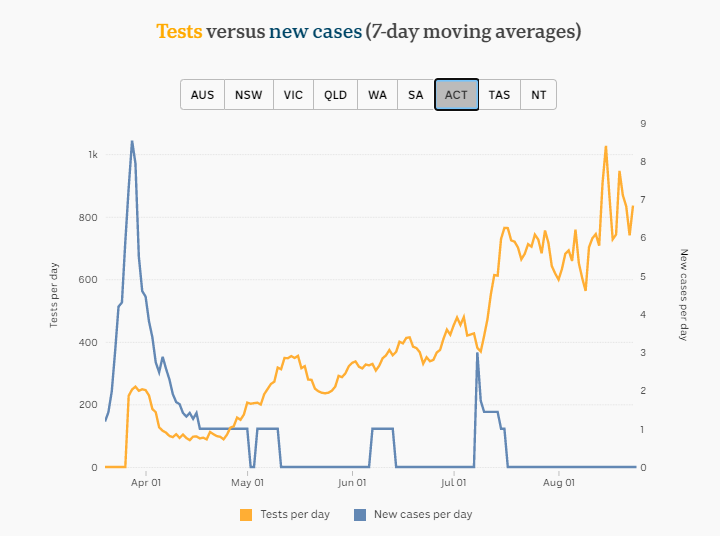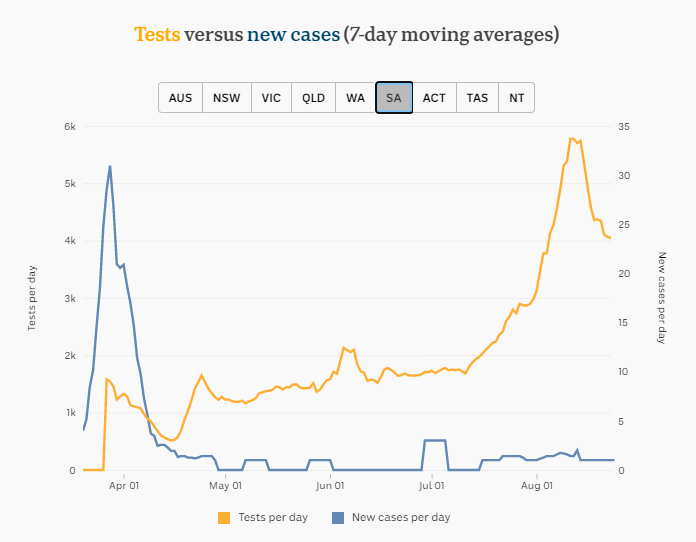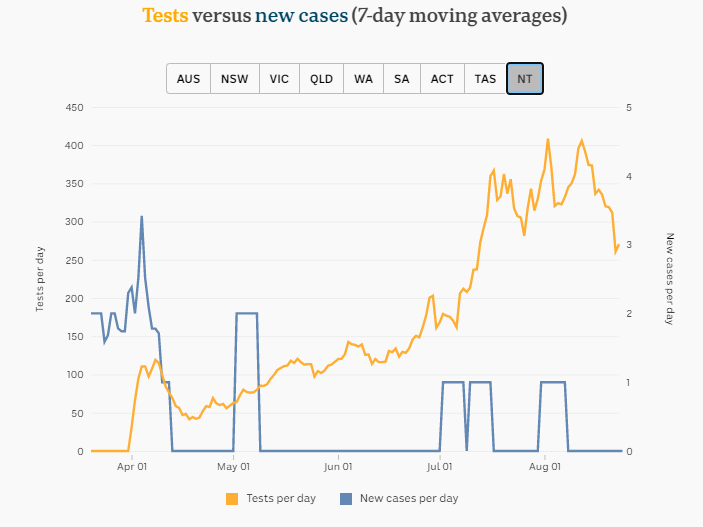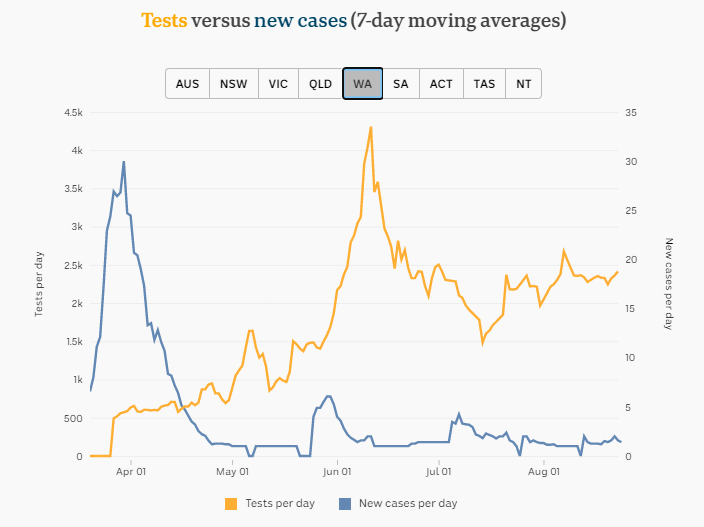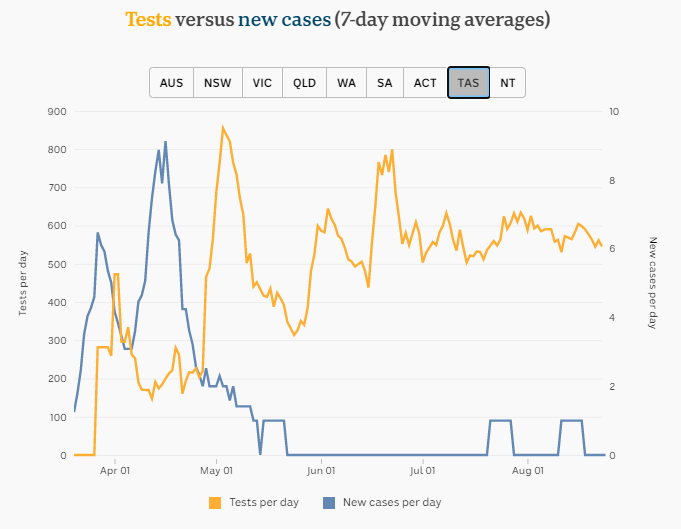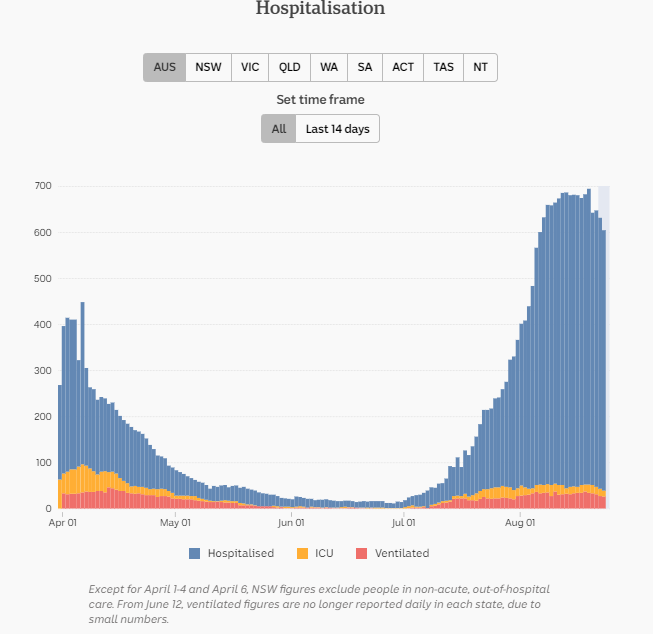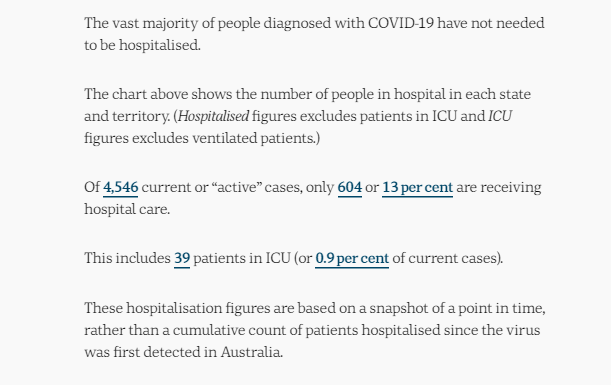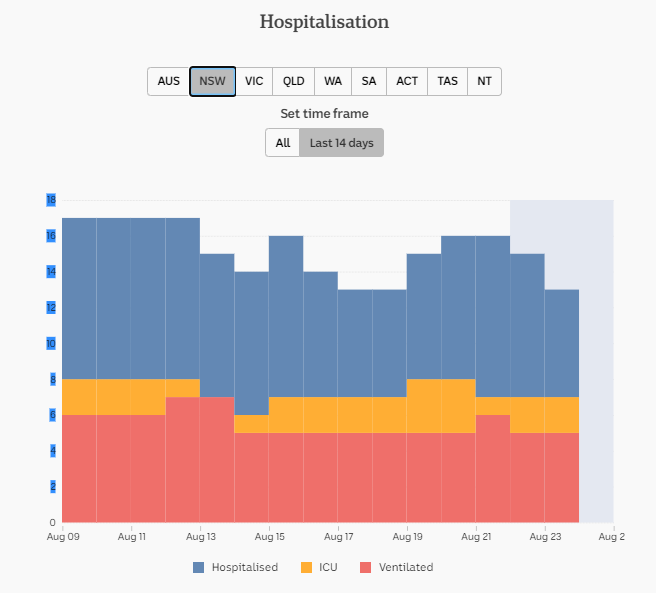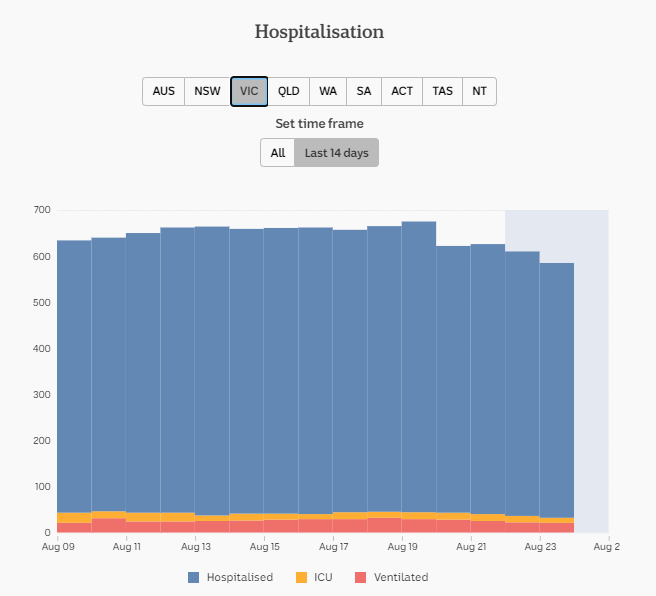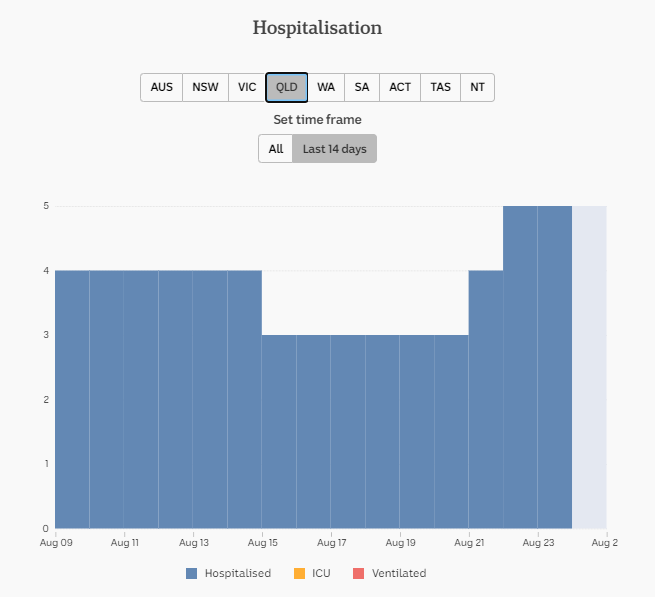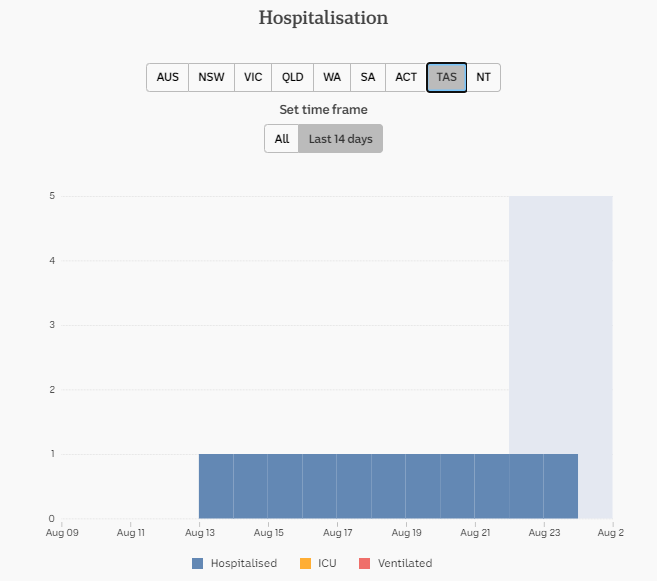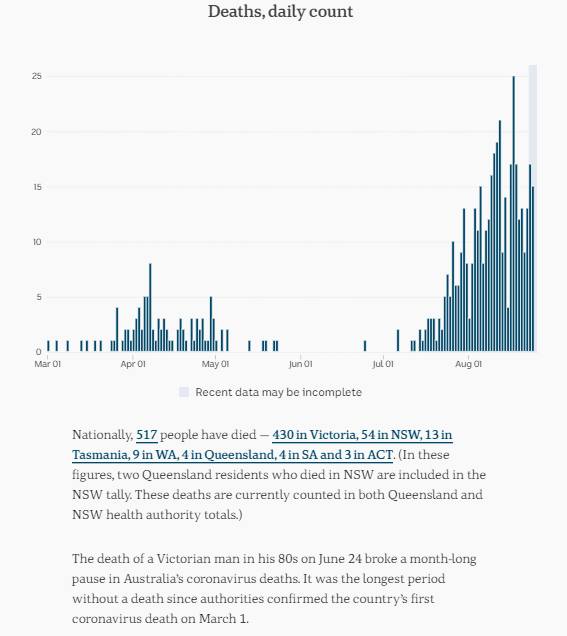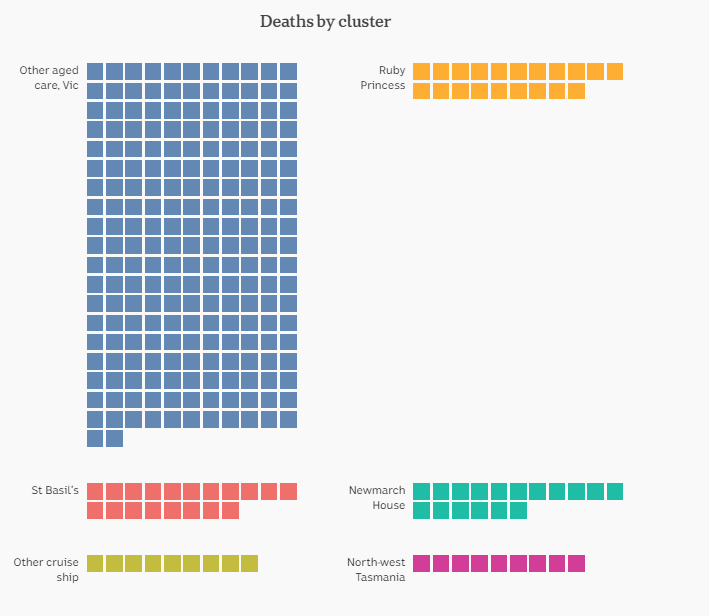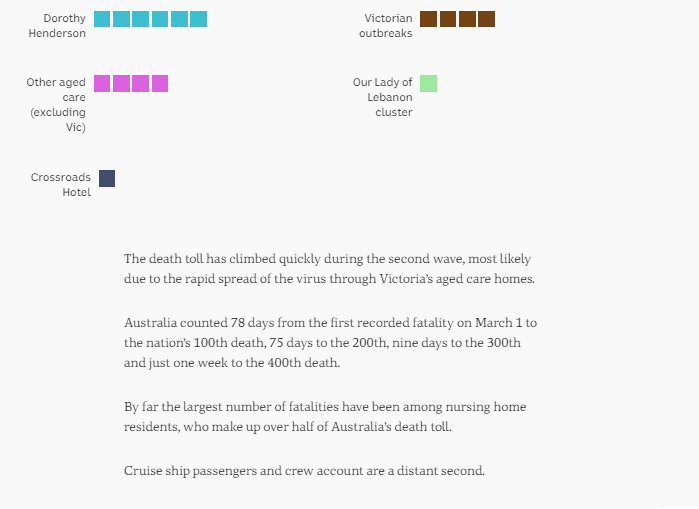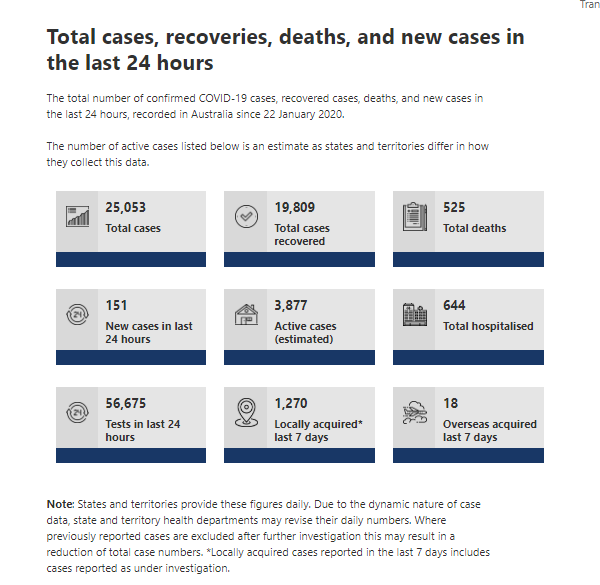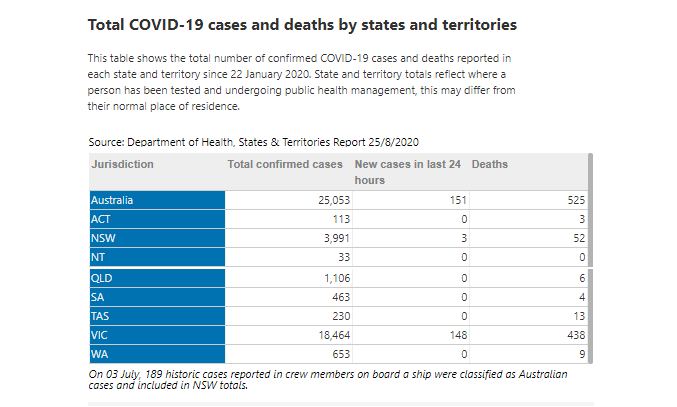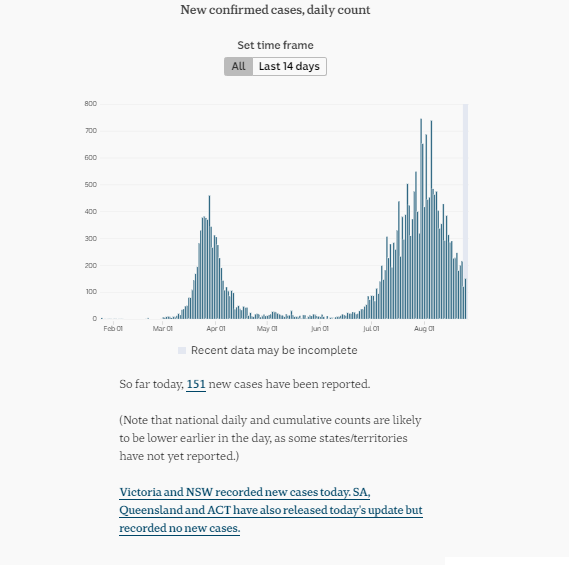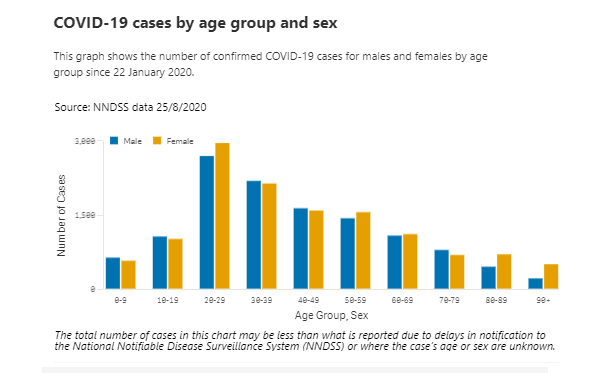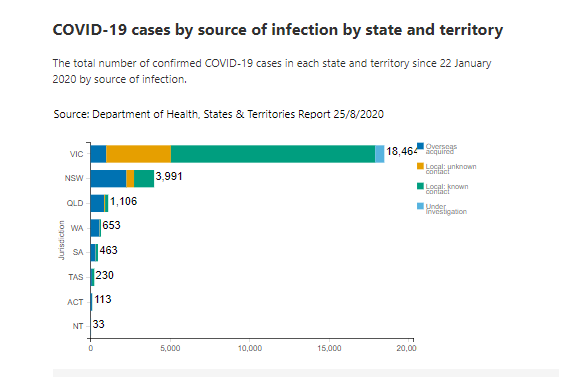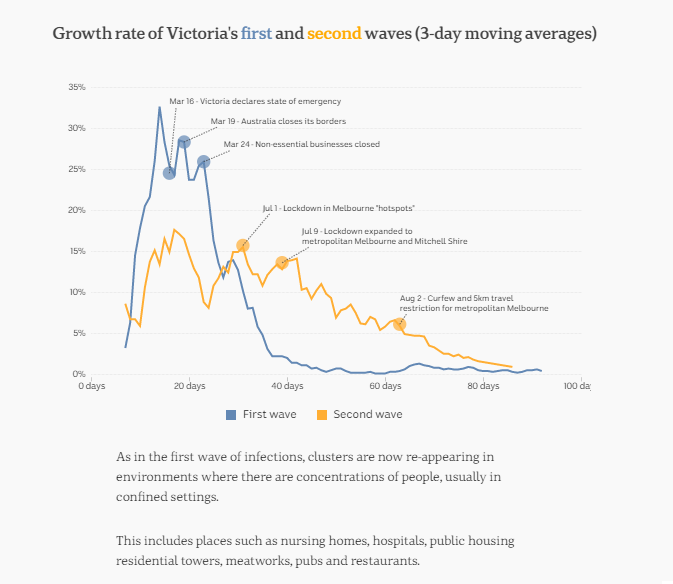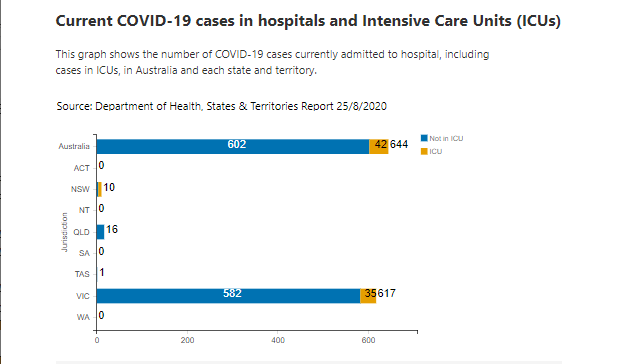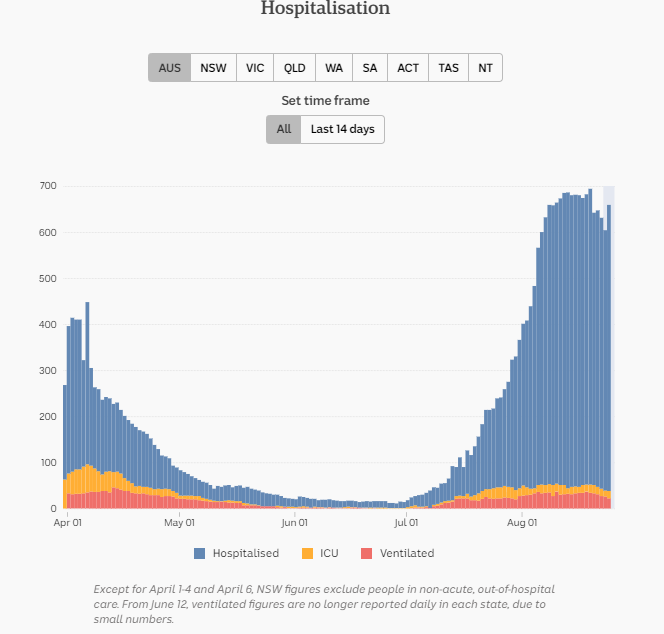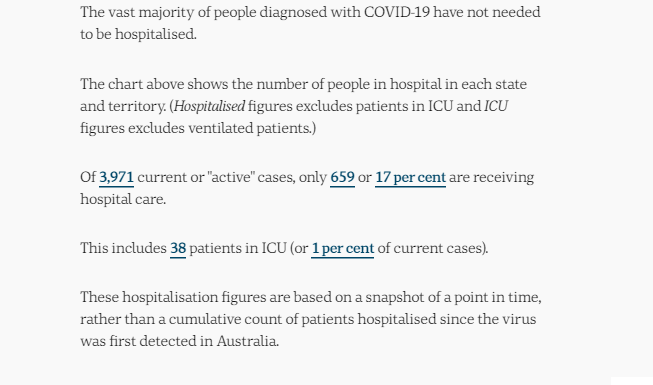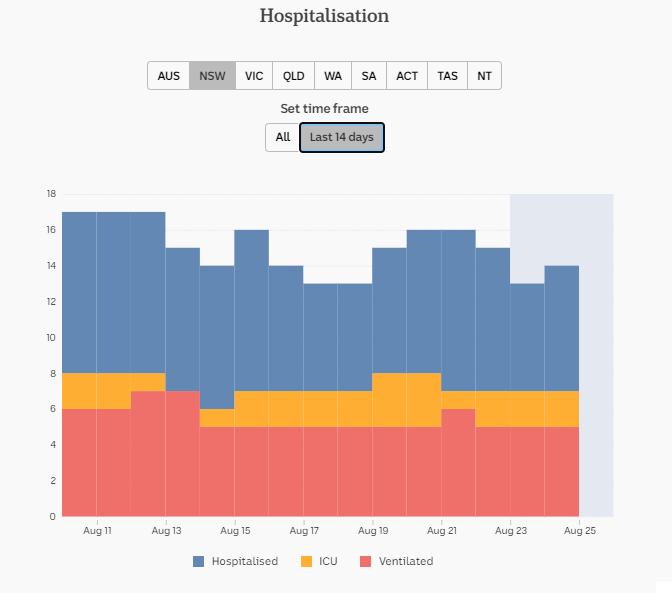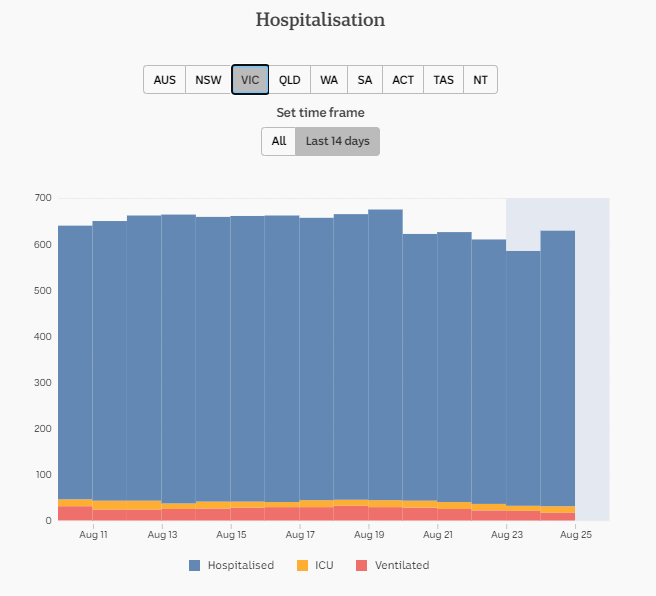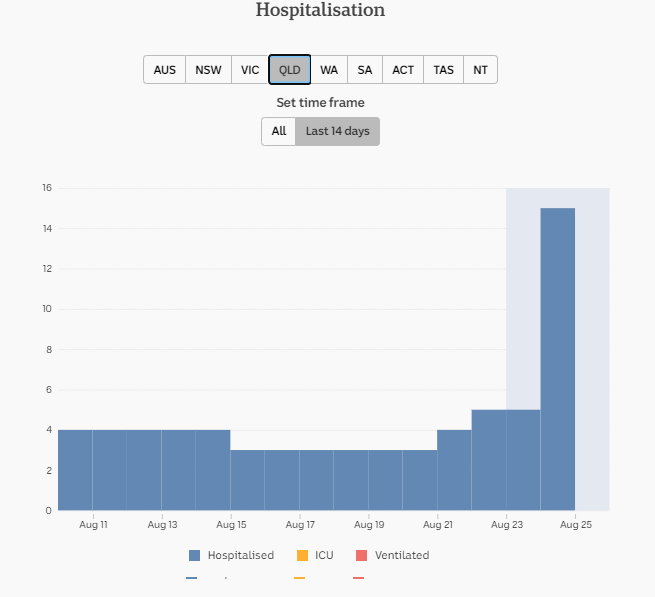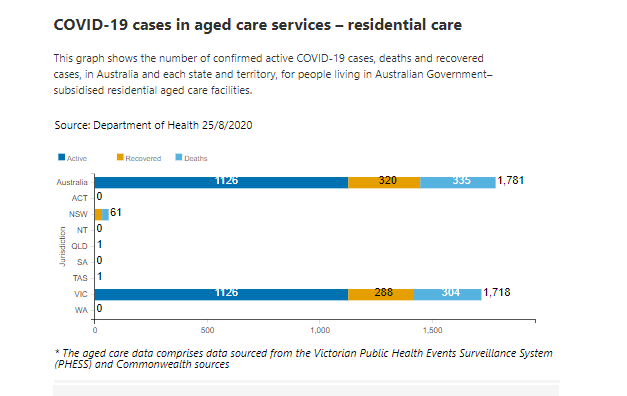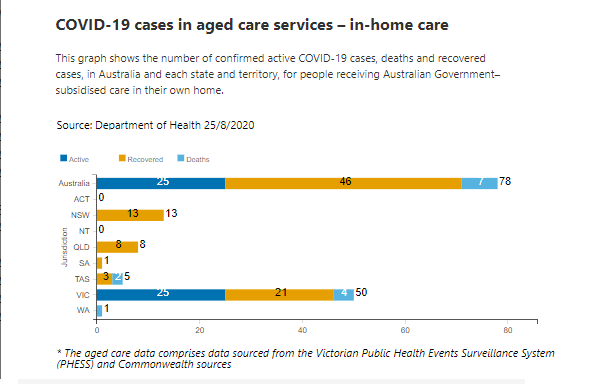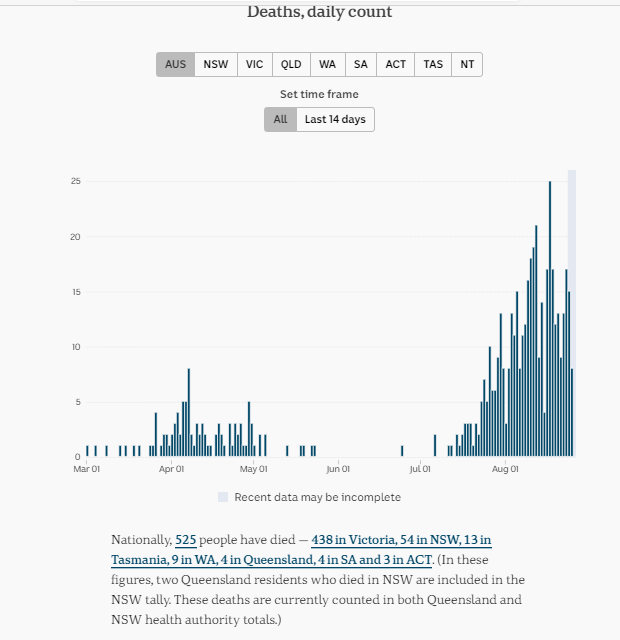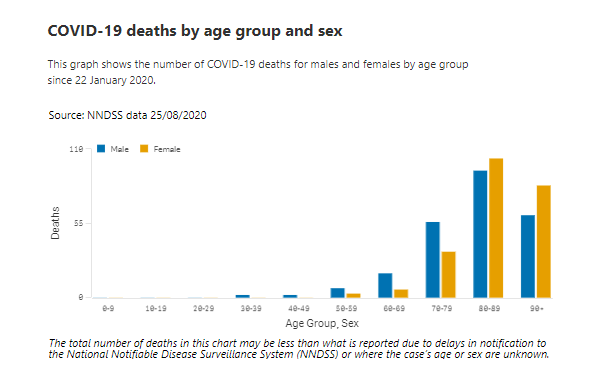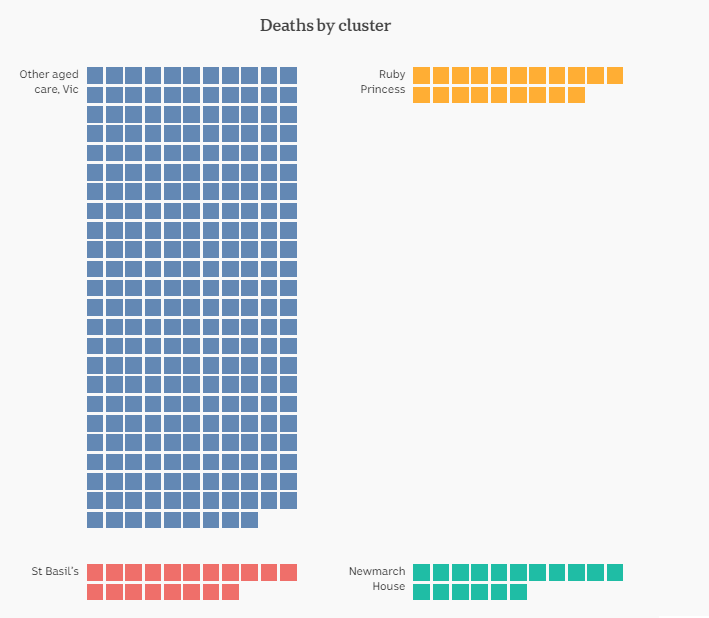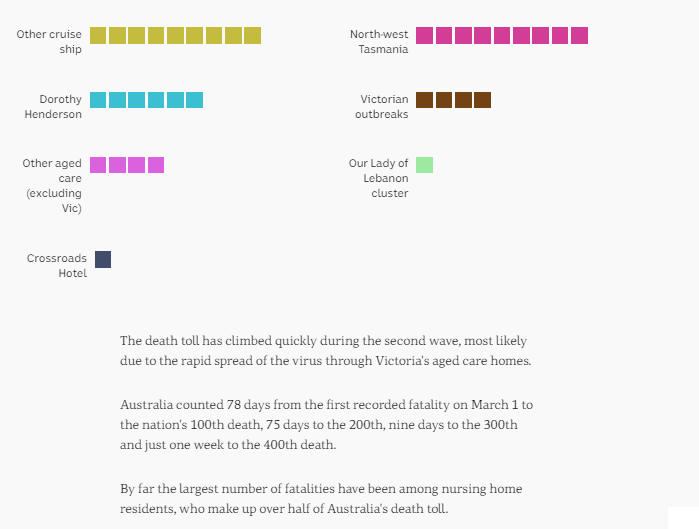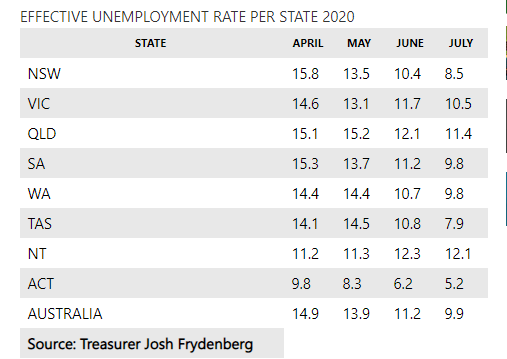23 AUGUST NSW
Four new cases of coronavirus in NSW, health authorities say
No clear link between two security guards at Sydney hotel quarantine diagnosed with coronavirus
Increase of suburbs pulled into COVID-19 alert
QUARANTINE
Second Sydney security guard tests positive to COVID-19
SCHOOLS
Formals banned in NSW schools due to COVID-19
BORDER ISSUES
‘Forgotten Australians’: regional areas need solution to state border closures, David Littleproud says
BREACHES
Four new cases of coronavirus in NSW, health authorities say
https://www.abc.net.au/news/2020-08-23/four-new-cases-nsw-coronavirus-nsw-health-reports/12586840Key points:
Two new cases were acquired overseas, one is linked to the Apollo Restaurant cluster
The fourth case, a security guard reported on Saturday, is under investigation
NSW Health warns that while case numbers are low, the virus is circulating in the community
There have been four new cases of COVID-19 diagnosed in New South Wales, bringing the total number of cases in the state to 3,796, authorities say.
Of the four new cases reported in the 24 hours to 8:00pm last night, two cases were acquired overseas and are in hotel quarantine.
One case is a household contact of a previously reported confirmed case linked to the Apollo Restaurant cluster.
NSW Health says the source of the remaining case — a hotel security guard reported on Saturday — is currently under investigation.
Health authorities urged anyone who visited Burwood's Westfield on Thursday, August 20 between 6:00pm and 7:00pm to monitor for symptoms after a confirmed case visited Kmart and Woolworths.
Anyone who visited Service NSW in Burwood between 2:30pm and 3:00pm on Friday, August 21 was also placed on high alert.
NSW Health said in a statement that they were pleased case numbers have remained low this week but warned "the virus continues to circulate in the community".
"It is vital that high rates of testing continue in order to find the source of the cases still under investigation and to identify and stop further spread of the virus," a spokesperson said.
NSW authorities are continuing to investigate any link between two security guards who became infected with COVID-19 after working in Sydney hotel quarantine.
The pair both worked at the Sydney Harbour Marriott Hotel but had limited interactions aside from a couple of shifts on August 3.
There is no indication of additional risk to the community from the hotel, NSW Health said.
NSW Chief Health Officer Kerry Chant said more than 700 people who worked at the Marriott Hotel for "an extensive period" after July 31 had been contacted.
"We are still following up and crosschecking all of our lists to ensure we have processes in place to ensure everyone on that list has been tested and clear of infection," Dr Chant said.
No clear link between two security guards at Sydney hotel quarantine diagnosed with coronavirus
https://www.abc.net.au/news/2020-08-22/nsw-second-security-guard-positive-coronavirus-marriott-hotel/12585526Key points:
NSW Health said the two guards weren't social contacts, but shared one shift at the hotel
A previously reported case attended the Westfield shopping centre in Mount Druitt, in Western Sydney, earlier this month
68 fines worth over $304,000 have been issued to hospitality venues for breaches so far
NSW chief health officer Kerry Chant says authorities have been unable to establish an "immediate connection" between a pair of Sydney hotel quarantine security guards who were infected with coronavirus.
Dr Chant said the second security guard at the Sydney Harbour Marriott Hotel tested positive to COVID-19 around midnight and contact tracers were unsure of how he contracted the virus.
The diagnosis comes days after another security guard, who worked at the same quarantine hotel, was diagnosed with COVID-19.
She said outside of a pair of August 3 shifts at the Marriott Hotel, they had limited interactions.
"The advice I have is that they are not known to each in terms of social contacts or close contact," Dr Chant said.
"Overtly, we don't have any links established."
She said the second security guard also worked a shift at the Sheraton Grand at Hyde Park on August 16.
The first security guard also worked at Parramatta Local Court and Sydney Flemington Market whilst infectious.
NSW Health said genome sequencing showed the security guard appeared to have a strain of virus similar to one found in a returned traveller at the hotel.
"The obvious conclusion [is], he was the exposed to same virus strain the other guard was," Dr Chant said.
Since the first guard was diagnosed on Monday, health authorities have contacted over 700 people who worked at the Marriott Hotel for "an extensive period" after July 31.
"We are still following up and crosschecking all of our lists to ensure we have processes in place to ensure everyone on that list has been tested and clear of infection," Dr Chant said.
"It is reassuring we have [only] determined that one case."
<< IN CASES LIKE THIS , SINCE THE AIR IN THE QUARANTINE MOTEL IS CENTRALLY AIRCONDITIONED AND THERE IS NO NATURAL AIR FLOW, THEN I'D BE LOOKING AT ESTABLISHING VIRAL AEROSOL MONITORING IN THE HALLS AND LOBBY AND IN THE AIR CON DUCTWORK TO ESTABLISH IF THIS IS THE HOW THE GUARDS ARE BEING INFECTED , AT MEAL BREAKS ( THIS BEING THE ONLY TIME THEY SHOULD BE ALLOWED TO TAKE OFF THEIR MASKS )>>
After an "intense investigation" including interviewing several hotel guests and reviewing CCTV footage, NSW Police said it found no evidence the first guard had wilfully breached public safety.
The second guard was not counted in today's nine new COVID-19 cases which were recorded overnight, which included two mystery cases.
Of the new cases, four were close contacts of previous cases whose source is under investigation.
One is a household contact of a case linked to the Tangara School for Girls in Cherrybrook cluster, two were linked to the funerals cluster.
For the latest news on the COVID-19 pandemic read our coronavirus update story.
One of Saturday's cases, NSW Health said, attended the Cabramatta Family Practice on August 20. The practice has been closed and contact tracing is underway.
The state's Deputy Chief Medical Officer Jeremy McAnulty said a previously reported case attended the Westfield shopping centre in Mount Druitt whilst infectious.
He said anyone who was at the shopping centre on Wednesday, August 12, between midday and 12:30pm or on Friday, August 14, between 11:00am and midday should monitor for symptoms.
Increase of suburbs pulled into COVID-19 alert
https://www.msn.com/en-au/news/australia/coronavirus-increase-of-suburbs-pulled-into-covid-19-alert/vi-BB18guzXMore suburbs across Sydney have been pulled into Sydney's COVID-19 alert with contact tracers racing to find out how six infected people with no obvious links to existing clusters came to be.
QUARANTINE
Second Sydney security guard tests positive to COVID-19
https://www.msn.com/en-au/news/sydney/second-sydney-security-guard-tests-positive-to-covid-19/ar-BB18gnk1A second security guard who worked at a Sydney hotel quarantine facility has tested positive for COVID-19.
Both of the guards who contracted the coronavirus worked at the Sydney Harbour Marriott.
An investigation is underway to understand how the men acquired the disease and if there were any security breaches.
https://www.msn.com/en-au/news/australia/second-security-guard-among-four-new-nsw-covid-19-cases/ar-BB18gBaoInfected guards worked together
The second guard to test positive was contracted to the Sydney Harbour Marriott Hotel while it was operating for overseas returned travellers in quarantine, NSW Health said yesterday.
He worked five shifts at the hotel; on August 3, 5, 9, 10 and 11.
He also did an overnight shift at the Sheraton Grand in Hyde Park on August 16.
Over 700 contacts of the two security guards have been tested for coronavirus since the first worker returned a positive result on August 17.
The guard and the first security worker to test positive worked together on August 3 at the Marriott Hotel.
SCHOOLS
Formals banned in NSW schools due to COVID-19
https://www.msn.com/en-au/news/australia/australia-records-246-new-coronavirus-cases/vi-BB18b9stProfessor Adrian Piccoli is from the Gonski Institute for Education and was the NSW Education Minister for six years. He says there shouldn't be a blanket ban on social events, when much of the state is coronavirus-free.
BORDER ISSUES
‘Forgotten Australians’: regional areas need solution to state border closures, David Littleproud says
https://www.msn.com/en-au/news/australia/forgotten-australians-regional-areas-need-solution-to-state-border-closures-david-littleproud-says/ar-BB18h1jXAgricultural minister David Littleproud has made another plea for “common sense” to prevail in regards to border restrictions, to clear a path for agricultural producers to navigate Australia’s closed states.
The Queensland minister accused state politicians of making coronavirus restriction decisions around capital cities and not taking into account the impact on regional communities, which have so far escaped the brunt of the pandemic.
Littleproud wants farmers to have freedom of navigation for agricultural production, which would allow them to cross closed state lines. The New South Wales and South Australian border closures to Victoria has created issues, as has the closure of the Queensland borders with NSW.
“We should do it in a safe way, and I think that we can do it if we’re listened to. Out here, we feel like we’re the forgotten Australians,” he told the ABC’s Insiders program.
“These decisions have been made and predicated on capital cities, not on regional Australians.
“It’s really distressing not only for businesses, but when you see the human toll of people not being able to access medical attention because that’s where they get it from the other side of the border.”
Regional communities were among the first to be closed off during the beginning of the pandemic, with communities worried their vulnerable healthcare systems would be overwhelmed. Travel restrictions were put in place to stop people from more populated areas traveling to smaller communities to isolate.
The national cabinet has agreed to develop a national code for cross-border travel for agricultural workers, which is expected to look similar to the way freight drivers operate, with the issue to be discussed at the next meeting in two weeks’ time.
But Littleproud now wants the states to move now to ensure farmers can travel freely, and that their livestock and produce remain cared for.
“Let me make this clear – they don’t need to wait two weeks for this. States can act unilaterally on this,” he said.
“Because two weeks will still see severe outcomes for agricultural production systems and particularly animal welfare.
Following the most recent national cabinet meeting, Australia’s medical expert panel has agreed to define what constitutes a coronavirus “hotspot” in an attempt to get uniformity across the nation.
But there is nothing binding states to blocking out regions from entry, even with a national definition.
Queensland has declared New South Wales a hotspot because it still has low levels of community transmission of the virus, while also declaring the ACT, which has no known cases of community transmission, because of its proximity to NSW.
The most recent border closures have seen a war of words erupt between political parties, with Labor leaders Michael Gunner and Annastacia Palaszczuk accused of closing off the Northern Territory and Queensland respectively for “political” reasons, a claim both have denied.
Western Australia has no border opening in sight and Tasmania’s borders will remain closed until at least 1 December.
Australians trying to fly home will have to remain patient after a decision not to increase international arrival numbers.
Acting chief medical officer Paul Kelly said on Saturday the cap on arrivals was to do with capacity and resources in quarantine hotels.
About 4,000 people are still returning to the country each week, and consular officials are supporting around 15,000 Australians abroad.
BREACHES
https://www.abc.net.au/news/2020-08-22/nsw-second-security-guard-positive-coronavirus-marriott-hotel/12585526The Red Lion Hotel in Rozelle has been hit with a $10,000 fine by Liquor and Gaming NSW, after footage of the event was seen by inspectors.
The popular city pub fined for hosting a birthday party for a former politician's son.
A spokesman for Liquor and Gaming said when police went to the venue, everyone attending the party was seated and observing COVID-19 rules.
But when they viewed CCTV footage, it was clear that guests had been mingling, shaking hands and hugging and standing while drinking before police arrived.
The booking was for four groups of 10 people, but the Red Lion had "skirted" the rules by splitting the booking, Liquor and Gaming Director of Compliance, Dimitri Argeres, said.
It's these sorts of social get-togethers that can spark a cluster and, when it comes to events like birthday parties and weddings, we've seen how quickly people are tempted to forget the rules and throw caution to the wind," he said.
"Extra conditions were imposed on hospitality premises because they are higher risk spaces: people consume food and drink there — they stay longer and they touch more surfaces, which means there is more opportunity for the virus to spread."
The hotel was also fined for other issues found by inspectors, such as having an out-of-date safety plan and patrons seated too closely at other tables.
Bars, cafes, restaurants, pubs and clubs across NSW have so far been fined $304,000.



